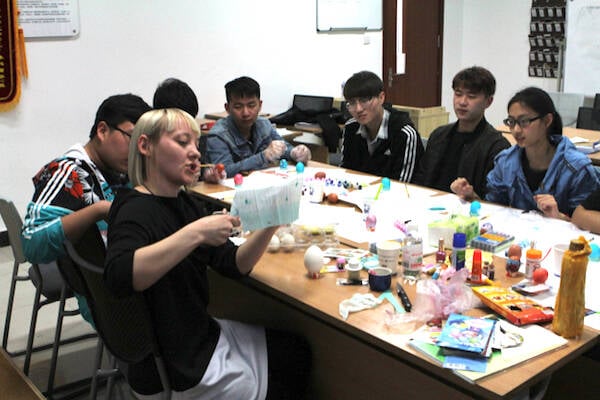By Jennifer Roman, University Teacher in Wuhan

As my first year of teaching at a Chinese university draws to an end, I’m honoured to share with you some knowledge I have gained from this experience. I hope this can be a helpful article if you have decided to teach at a university here or if you are considering it. I ‘m really happy with my choice to choice to teach at a college and I’m sure you’ll love it as much as I have!
About Chinese Universities
First, I’ll share a little bit about my school. I work at Wuhan Polytechnic University (武汉轻工大学). It’s in Wuhan, Hubei province, which is the the biggest city in Central China – as well as the biggest university city in the world!
Often universities in China have specialisations for example, in my city, there is Wuhan Sports University, Hubei Institute of Fine Arts, Wuhan Music Conservatory, Wuhan Textile University, and Hubei Agricultural University. My university specialises in Food Science Engineering meaning it is the best university in the region to provide expert knowledge in this field.
Despite having specialisations, universities here in China usually offer a wide range of degrees. My university has twelve departments producing dozens of degree options for students. Some examples of majors at my school include Teaching Major, English Major, Electrical Engineering Major and Business Administration Major – just to only name a small few. There is also a Logistics Major which specialises in more effective ways to deliver online shopping – how Chinese! There was a rumour that there is a Bra Engineering Major. Our school offers a Beer Brewing Major in which students go on exchange to Germany!
Every university is unique. The top hundred or so universities are run nationally by the government. The next tier of universities come under the governance of the province. On top of this, each university has a lot of autonomy when it comes to decision-making. This results in many universities having different rules with regards to curfews, or morning exercises, or flexibility for students to leave. Some universities are stricter and more traditional having many rules for students to follow, while others are more contemporary and allow the students more independence.

Campus at Twilight
Biggest Differences
Firstly, let’s talk about the military training. Although the orientation week of many Western universities involve colourful social events (and alcohol), the freshman at Chinese universities are committed to an on-campus, three week long military training course. Units of green army clad freshman are taught discipline, training and marching. It was a little astounding in the first couple days to witness this but by the end of September I had accepted the proceedings as pretty normal!
Non-freshman students are relieved they don’t have to do it again the next year because of the early mornings, late nights and marching and standing in the hot sun. Yet, overall, it is deemed as a positive custom: the discipline, the introduction to the university and the “getting to know each other” of the new classmates are important takeaways of the training tradition.
Another major difference between the universities are the rules. It is noticeable how many more rules Chinese students must abide by compared with their Western counterparts. In my university, the student must be back by their 11pm curfew every night, and on weekdays the electricity is switched off at this time too! Freshman and Sophomore students must also wake up every weekday morning and complete twenty minutes of morning exercises (unless it’s raining). This rule is stricter than a lot of other colleges, although most have some degree of physical exercise requirement: one university in my city has a 5km round track in which students must run around 10 times a semester – getting it signed off with their student card when they do. Students also must pass fitness tests and weekly room inspections. Additionally, freshman at our school have two months of mandatory evening training in the lead-up for a two-day sports competition held in April.
In some ways the university system here is more formal but in other ways it is not. My university in Australia had the school calendar and exam dates planned years in advance however my university here in China don’t see the importance in this advance-planning. The drawback is that you might have to wait patiently to book your holidays – however it works in your if you need to change something in the course because students are accustomed to last minute changes and decisions.
The last big difference I should mention is the absence of a drinking and party culture! Students may once in a while head to KTV, or might have beers with dinner, or baijiu on special occasions, however, bars and clubs on campus is completely unheard of. My students were very surprised when I told them it was the norm back home!
Similarities
So although the universities in West and East can feel very different at times, there are many similarities. The university concept is the same: institutes provide students with advance learning and a qualification. Socially, it’s also a rite of passage to adulthood. No matter where, students have exams, tests, classes and they make some pretty special memories on the way.

Happy Freshmen
Inside the Classroom
Just as with Western classrooms, there are a mix of motivations within the classes. This can come be explained by the college placement system. In the final year of high school, students choose six preferences of their desired university+major combinations. Then, universities select the students with the highest grades. Also, it is not uncommon for students to be selected by a particular university but then placed in a different major. For example, I have some students who applied for Engineering but whose grades weren’t high enough so they were offered English. Because of this system, classes can be a mix of highly enthusiastic students, along with the students who are making the most of an unfavourable situation, along with others who you can see are really dissatisfied with the major they are in. Places in university are highly valued and it is very difficult to change majors.
Apart from work ethic, students are from all backgrounds and locations. Students can choose universities from all over China. While some students prefer to study close to their hometown, others eagerly take the opportunity for independence and fly far from the nest. My classrooms are diverse – many of my students are from different cities in Hubei, however I have students from Xinjiang, Yunnan, Hunan, Fujian, Shaanxi, Anhui, Inner Mongolia and Shanghai. It’s really a great opportunity to learn so much about China from all the different backgrounds.
There is no average Chinese student. For me, a class is a dynamic combination of personalities. Although at the beginning of the year my classes appeared as big groups of similar shy and wide-eyed students, as the year progressed they spoke out more. I really saw them grow as individuals – especially my freshmen – and I now appreciate how different they all are.
There is more respect for the teacher inside Chinese classrooms. I feel very privileged for this. Teachers in China are held in high regard in society and China has a culture which respects authority. For me, I found that this didn’t mean the students were automatically well-behaved but instead maybe they would just be more obedient and less argumentative than if they were in a Western classroom. Secondly, I found although there was the initial respect at the beginning of the year, I needed to work to deserve it and maintain it throughout the semesters. With a note about discipline, as much as I encouraged the students to be independent – sometimes enforcing and creating classroom rules were in their best interest because they are so accustomed to regimen.
About Oral English
There is a good chance you will be teaching Speaking or Oral English so here is some useful information about their speaking background. If you didn’t already know, English is a mandatory exam in the College Entrance Examination – although students are only assessed on their reading and writing skills. This has several consequences which are easy to witness in the college classroom. Firstly, the students level of speaking is much lower compared with their writing. Because speaking is not required in the exam, there is little use for students to practice speaking during their busy high school years, nor is their any point for schoolteachers to teach it. A second consequence is that students speak very formally because the English words they have learnt are usually from classical writings. A third consequence is that students are very shy to speak, especially in front of classmates and a new foreigner teacher! When freshman arrive at College they could have never spoken to a foreigner, let alone had an English conversation.
My goals for teaching English was to create a comfortable environment for them to speak. And to teach them how to speak without relying on their written words, nor from their memorised notation, and to encourage them to them to speak naturally.
Teaching Techniques I Found Useful
I used a variety of teaching methods. My classes usually began with a game, then we would go through homework, then practice a pronunciation sound, then maybe have a handout with new words and phrases. In the second half of the lesson they would prepare some sort of presentation (role-play, speech, group discussion answers, already-written plays, monologue) and then they’d present it. I’d write the lesson structure on the board and cross off each activity when it finished. I changed between individual, pair work and group work.
I’d try to create the lessons so the students would have much speaking time as possible. An effective method I used was simple imitation – where I would say words or sentences from the handout and they would chorus after me. This gave them exposure to words they have always seen but have never had the opportunity to speak, and the group-speaking meant that shy students could practice speaking without the spotlight being on them, thus boosting their speaking confidence.
Chinese College Life
The students are busy. They have many classes. On top of this there can be extra early morning mandatory reading classes, or mandatory self-study in the evening. Weekend classes are not uncommon. My school also demands students to take on a certain number of extra-curricular activities per year to graduate – for example speech competitions, debate competitions and sports competitions.
Funnily enough, although they seem busy and swamped with homework and assignments, they often feel relieved at all the extra free time they have when compared with their high school life preparing for the College Entrance Examination.
On top of their class commitments, students take part in social clubs and activities around campus. Painting club, volunteering, rollerblading club are just some of the ones at my university. Some students have part time jobs.
The most popular hobbies of my students include listening to music, going out for dinner, going to the movie theatre, jogging, playing basketball, playing video games (at net bars or cafes), playing on their phones, watching TV on their phones, talking with their friends using their phones and shopping (both at the mall and online from their phones). By far, their favourite hobby is sleeping, yet many admit they don’t get enough sleep at night because they are addicted to playing on their phones!
Living on Campus
Chinese universities often provide their foreign teachers with an apartment on campus. The exact living arrangements vary from university to university. Living on campus is very convenient because you spend such little time commuting to work! Don’t worry – you won’t have a curfew like the students do.
Living on campus also means you can have access to a lot of conveniences which are there for the students . On-campus shops, printing facilities and dining halls are at your fingertips. Snack shops and restaurants would not be far away. Also, campuses are well secured within in a complex so it is very safe.

Sophomore class at our grand Confucius statue
Daily Schedule
A common contract for foreigners includes a maximum of 16 hours of teaching. This could be a maximum of 8 classes of around 100 minutes each. These hours would fall between the normal 8-5.30 Monday to Friday. You might get a night class. A day off is common, or at least classes are a relaxed spread across the week where you may only teach one class in the day.
The school year begins in September, (Freshman begin in October) and ends mid-June. Semesters are about 16-18 weeks long and there is a lovely 6-8 week break in the middle for Spring Festival which is another nice little perk of teaching at a university.
Things you can get involved with
Students are very friendly and will always be willing to play sports with you or have a meal. You will probably be invited to perform at a “party” (concert) which they hold on special occasions. Although mine doesn’t, many colleges have English Corners which you could be asked to help at. More formally, you will be probably asked to judge an English speech, song, debate or drama competition. Basically, you can be involved in bustling college life as much or as little as you want. A cool thing about teaching college students is that you can hang out with your students – there isn’t a big age difference between me and my students.
Well, that’s it, folks! I could have written a book on the topic I think. It’s certainly an experience I’ve really cherished – I’ve made such fond memories both in and out of the classroom. This was just an introduction so I hope you can find out the rest when you come and teach at a university here!
(Source: Jennifer Roman)
![]()
Related Articles
- What it is like to be an English teacher in a second tier Chinese city
- Jessica: What it’s like teaching English to university students
- My experiences teaching English at the university level in China



